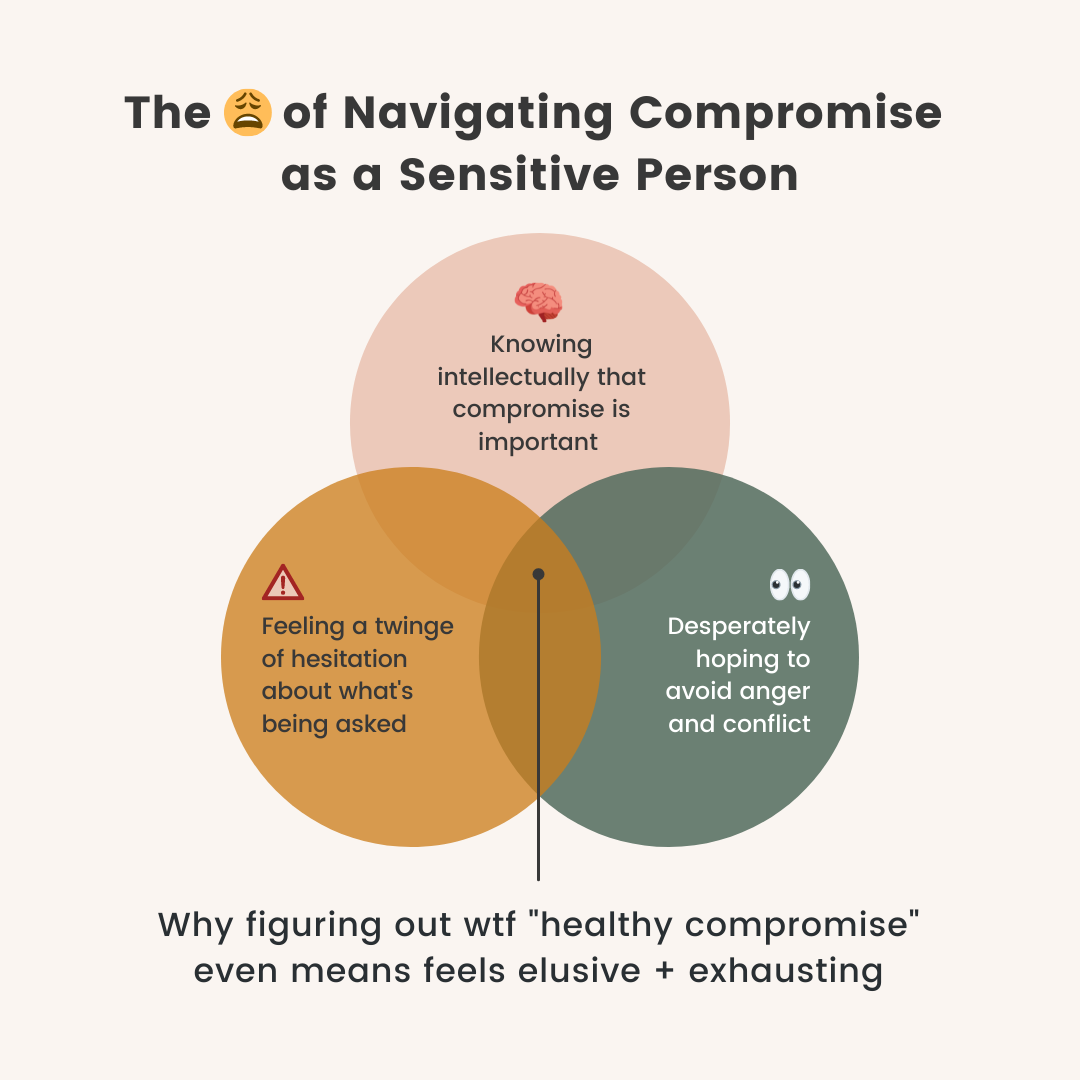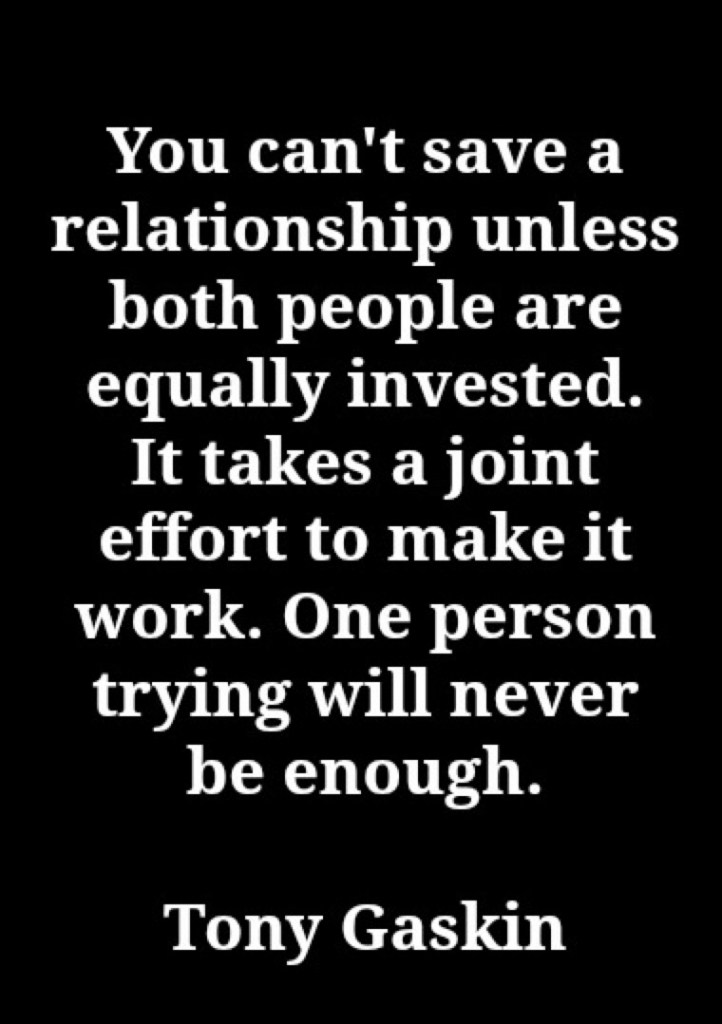
Have you ever found yourself constantly stuck in situations where you feel like you’re the only one making compromises? It can be frustrating and make you question whether your needs and wants are being ignored. Well, fear not, because the “Why Do I Feel Like I’m Always The One Compromising?” product is here to help. This unique tool will empower you to understand the underlying reasons behind this pattern and provide you with practical strategies to break free from the cycle of always being the one to give in. With this product, you can reclaim your voice, assert your needs, and find a healthier balance in your relationships. Say goodbye to feeling like you’re always the one compromising and start living a more fulfilling and balanced life.

This image is property of www.highlifenorth.com.
Causes of Feeling Like Always Compromising
Lack of assertiveness
One common cause of constantly feeling like you’re the one compromising is a lack of assertiveness. When you struggle to assert your own needs and desires, you may find yourself continually giving in to others’ wants and needs. This can lead to feelings of frustration and a sense of always being taken advantage of.
Fear of conflict
Fear of conflict can also contribute to the feeling of always compromising. If you avoid confrontation at all costs, you may end up sacrificing your own needs to keep the peace. This fear can stem from a variety of sources, such as past negative experiences or a desire to be liked by others. However, avoiding conflict can ultimately result in resentment and a lack of satisfaction in your relationships.
People-pleasing tendencies
Having people-pleasing tendencies can make you more likely to engage in constant compromise. Wanting to please others and gain their approval can lead to putting their needs before your own. While it’s important to be considerate of others, it’s equally important to prioritize your own well-being and happiness.
Low self-esteem
Low self-esteem can play a significant role in feeling like you’re always compromising. When you don’t have a strong sense of self-worth, you may believe that your needs and wants are less important than those of others. This mindset can lead to consistently putting yourself last and sacrificing your own happiness in the process.
Impact on Mental and Emotional Well-being
Feelings of resentment and frustration
Constantly compromising can generate feelings of resentment and frustration. When you consistently prioritize the needs of others over your own, it’s natural to start feeling unappreciated and taken for granted. These negative emotions can build up over time and put a strain on your mental and emotional well-being.
Increased stress and anxiety
The constant pressure of compromising can cause increased stress and anxiety. As you continually try to balance everyone else’s needs with your own, it’s easy to become overwhelmed and drained. This chronic stress can lead to physical symptoms such as headaches, difficulty sleeping, and a weakened immune system.
Diminished sense of self-worth
Always being the one to compromise can chip away at your sense of self-worth. When your own needs consistently take a backseat to the needs of others, it can be challenging to maintain a strong sense of identity and value. Over time, this can lead to feelings of self-doubt and even contribute to conditions like depression and anxiety.
How to Address the Issue
Recognize your own needs and priorities
To break free from the cycle of constant compromise, it’s essential to recognize and prioritize your own needs and priorities. Take the time to reflect on what truly matters to you and identify areas where you’ve been consistently sacrificing your own desires. Acknowledging these needs is the first step towards reclaiming your power and establishing healthy boundaries.
Practice assertiveness and boundary-setting
Developing assertiveness skills is crucial in addressing the issue of always compromising. Practice expressing your needs and desires in a clear and direct manner, while also respecting the needs of others. Learning to set firm boundaries is also essential to prevent yourself from being taken advantage of or pushed beyond your limits.
Develop healthy communication skills
Improving your communication skills is vital in promoting balanced compromises. By learning to express yourself effectively and actively listening to others’ perspectives, you can create a space for open and honest dialogue. Effective communication can help prevent misunderstandings and conflicts while fostering understanding and empathy.
Build self-confidence and self-esteem
Working on building self-confidence and self-esteem can play a significant role in reducing the urge to always compromise. Focus on nurturing self-compassion and engaging in activities that bring you joy and a sense of accomplishment. Surround yourself with supportive and positive influences that uplift and support your growth.
Effective Communication Strategies for Balanced Compromises
Active listening
Active listening is one of the most powerful communication strategies for promoting balanced compromises. When engaged in a conversation, give your full attention to the other person and genuinely listen to their perspective. This helps you understand their needs better and encourages open dialogue.
Clear and concise expression of needs and concerns
When expressing your own needs and concerns, it’s important to be clear and concise. Avoid beating around the bush or using passive language. Clearly articulate what you need or want while also being respectful and considerate of others’ perspectives.
Seeking common ground
Look for areas of common ground when negotiating compromises. Identify shared goals or interests that can help bridge the gap between different perspectives. By finding commonalities, you can work together towards a solution that satisfies everyone involved.
Collaborative problem-solving
Approach conflicts and challenges as opportunities for collaborative problem-solving. Instead of viewing compromise as a win-lose situation, adopt a mindset that focuses on finding a win-win outcome. This approach encourages cooperation and creativity, allowing for more satisfying compromises to be reached.

This image is property of www.highlifenorth.com.
Seeking Support and External Resources
Therapy and counseling
If you’re struggling with feeling like you’re always the one compromising, seeking therapy or counseling can provide valuable support. A mental health professional can help you explore the underlying causes of this pattern and provide guidance on developing healthier relationship dynamics.
Building a support network
Surrounding yourself with a supportive network of friends, family, and individuals who value your needs and boundaries can also be beneficial. Having people who understand and respect your journey can provide encouragement, advice, and a sense of belonging.
Self-help books and resources
There are various self-help books and resources available that can help you understand and address the issue of constant compromise. These resources often provide practical strategies, exercises, and insights to empower you in creating healthy boundaries and fostering balanced compromises.
Setting Boundaries and Prioritizing Self-care
Identifying personal limits and boundaries
Setting and maintaining personal limits and boundaries is crucial in reducing the need for constant compromise. Take the time to identify your boundaries, both physical and emotional, and clearly communicate them to others. Remember, it’s okay to prioritize your well-being and say no when necessary.
Learning to say no
Learning to say no is an important aspect of setting boundaries and prioritizing self-care. Practice saying no to requests or obligations that don’t align with your needs or values. Saying no doesn’t make you selfish; it’s an important act of self-respect and self-preservation.
Practicing self-care and self-compassion
Making self-care a priority is essential in breaking the cycle of always compromising. Engage in activities that nurture your physical, mental, and emotional well-being. Practice self-compassion by treating yourself with kindness and understanding, especially when you need to prioritize your own needs.
This image is property of qph.cf2.quoracdn.net.
Recognizing Unhealthy Relationship Dynamics
Codependency
Codependency is a type of unhealthy relationship dynamic that often involves excessive reliance on one another for emotional and psychological needs. In codependent relationships, there is typically an imbalance of giving and receiving, with one person consistently compromising more than the other. Recognizing codependent patterns is crucial in establishing healthier relationship dynamics.
Manipulative behaviors
Manipulative behaviors, such as guilt-tripping, gaslighting, or emotional manipulation, can also contribute to a feeling of always compromising. These behaviors often seek to control or manipulate others into conforming to their desires, disregarding individual needs and boundaries. Awareness of manipulative actions is essential in breaking free from their influence.
Unequal power dynamics
Unequal power dynamics in relationships can further perpetuate the pattern of always compromising. When one person holds more power or control in the relationship, it can lead to an imbalance where one individual’s needs consistently take precedence. Recognizing and addressing these power imbalances is crucial in fostering healthier and more egalitarian relationships.
Understanding the Value of Compromise
Balancing individual needs with collective goals
Compromise plays a vital role in balancing individual needs with collective goals. While it’s important to prioritize your own needs and boundaries, it’s also necessary to consider the needs and desires of others. Striking a balance between individuality and collaboration fosters healthier and more harmonious relationships.
Promoting healthy relationships
Compromise is an integral part of building and maintaining healthy relationships. It allows for open communication, understanding, and finding common ground. By embracing compromise, you create an environment that promotes trust, teamwork, and mutual respect.
Fostering growth and development
Compromise encourages personal growth and development. It provides opportunities to broaden your perspective, challenge assumptions, and develop problem-solving skills. Through compromise, you can cultivate empathy, flexibility, and resilience, contributing to your personal growth and overall well-being.

This image is property of i0.wp.com.
Gaining Confidence in Decision-Making
Developing self-trust
Gaining confidence in decision-making starts with developing self-trust. Reflect on your values, beliefs, and personal goals to understand what truly matters to you. Trust yourself to make decisions that align with your authentic self and empower your overall well-being.
Analyzing pros and cons
When faced with decisions that require compromise, take the time to analyze the pros and cons. Consider the potential benefits and drawbacks of different options, both for yourself and others involved. This analysis can help you make informed decisions and feel more confident in your choices.
Seeking guidance and input
Seeking guidance and input from trusted individuals can also boost your confidence in decision-making. Discussing your options with those who understand and support your journey can provide valuable insights and perspectives. However, remember to maintain your autonomy and make decisions based on what feels right for you.
Conclusion
Feeling like you’re always the one compromising can have a detrimental impact on your mental and emotional well-being. By addressing the underlying causes, practicing assertiveness, developing healthy communication skills, and setting boundaries, you can break free from this pattern. Recognize the value of compromise in maintaining healthy relationships, prioritize self-care, and gain confidence in your decision-making abilities. Remember, it’s essential to prioritize your needs and happiness to cultivate a fulfilling and balanced life.






